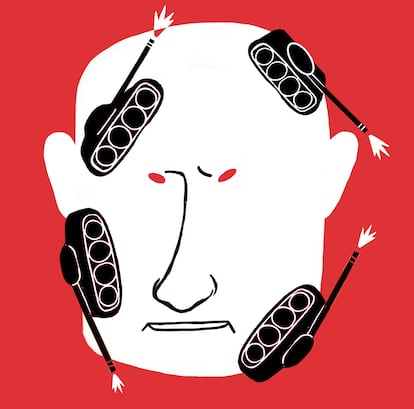Putin’s unachieved goals in Ukraine
The Russian president has not altered the principles he invoked to attack Kyiv, which involve the United States and NATO submitting to his will

Vladimir Putin has not altered the objectives he invoked to invade Ukraine but these, as he stated them, are riddled with ambiguities and do not constitute a list suitable for implementation. Ukraine, the United States and NATO countries could only meet the Russian president’s demands by fully submitting to his will, and Putin’s will is for the West to leave Ukraine at his mercy. Accepting this would be equivalent to a distribution of spheres of influence on the continent, reminiscent of the agreements reached by the victors of World War II in Yalta in 1945.
In his recent interview with American journalist Tucker Carlson, Putin rhetorically asked why the United States insisted on helping a country as far away as Ukraine, having so many serious problems on its own borders. “Wouldn’t it be better to come to an agreement with Russia [...] understanding the situation that has arisen today, understanding that Russia will fight to the end for its interests?” Putin noted. The idea that Russia can be defeated militarily is an “illusion” motivated by “arrogance or naivety,” but not “by intelligence,” the Russian leader stressed, and recommended that countries that advise Ukraine to fight to the end should make “adjustments” in their policies, given the impossibility of a “strategic defeat” of Russia.
“No, at the moment we have not achieved our goals, because one of the goals is denazification,” Putin acknowledged to Carlson. Russian leaders treat the democratically elected Ukrainian leaders as “neo-Nazis” and accomplices of such, and it follows that “denazification” would imply forming a puppet government of Moscow in Kyiv.
On February 24, 2022, when Russian tanks were already advancing through Ukraine, Putin mentioned the purposes of his offensive. In addition to “denazification,” he alluded to the defense of the inhabitants of Donbas from the “genocide” for which he blames Kyiv. He also made reference to the “demilitarization” of the country and the “prosecution of those who committed numerous bloody crimes against peaceful citizens.” “The occupation of Ukrainian territories is not in our plans. We are not going to impose anything on anyone by force,” Putin assured then. Today, Russia occupies almost 20% of the surface of Ukraine and has shielded itself from possible setbacks, mentioning in its constitution (as Russian territory) regions of Ukraine that it does not even control.
In a draft agreement on security guarantees presented to the U.S. and NATO at the end of 2021, Moscow demanded that the Alliance commit to reducing its infrastructure and military potential in Europe to the level of 1997, that is, to the time before the addition of new members that were once allies of the USSR or a part of it. The document indicated that Putin wanted to review the expansions already carried out in addition to avoiding future ones. Two years later, Russia has nearly 1,500 kilometers (932 miles) more border with NATO (the length of the land and maritime border between Finland and Russia).
The Kremlin’s policy is supported by an increasingly harsh repression apparatus. In March 2022, Russia introduced two new crimes into its penal code, namely “hoaxes” about the army (any statement that disagrees with the official position can be assessed as such) and “discrediting” state institutions (any criticism not accepted by the authorities). For hoaxes considered serious, up to 15 years in prison are contemplated.
In Russian society, there are pockets and topics of dissatisfaction that manifest themselves punctually without articulating themselves into an alternative force. A recent example has been the multitude of people who in various Russian cities waited in the streets to support with their signature the candidacy for the presidency of Boris Nadezhdin, the only politician willing to campaign against the war in the elections next March. Nadezhdin has been rejected as a candidate by the central electoral commission, but the lines of citizens willing to endorse him were in themselves a brave demonstration against official militarism. Yevgeny Prigozhin’s mutiny and the march of his Wagner mercenaries towards Moscow also indicated dissatisfaction, although, in this case, in favor of a more effective imperial policy. By placing flowers in the snow in memory of Alexei Navalny, Russians rejected the brutality of the system embodied in a symbolic and defenseless character.
However, the majority of society supports its president, who according to polls by the Levada center enjoys 80% approval among his fellow citizens. Russians (more than 70%) want peace in Ukraine, but their own kind of peace. Only a minority believes that the return of occupied lands is a “preferable” or “acceptable” condition for an agreement (22% are willing to return the territory in Zaporizhzhia and Kherson to Ukraine, and 16% are willing to return the self-proclaimed popular republics of Donetsk and Luhansk). “Russian society is not yet ready for tangible compromise with Ukraine,” say Denis Volkov and Andrei Kolesnikov in an analysis of opinion polls for the Carnegie International Endowment for Peace.
After a long stagnation on the front, the advance of Russian troops is picking up and confronting seasoned Ukrainian fighters that are dependent on dwindling Western war supplies. The rulers willing to maintain military support for Ukraine (because they believe that Russia will not stop there) predominate in the West, where voices are also heard in favor of some ceasefire formula in which Moscow would retain de facto control of its conquests or part of them, while Ukraine would gain respite and security guarantees.
The Ukrainian leaders absolutely refuse to give up territory, despite those who fear and warn that this option could be presented to them again in worse conditions in the near future. But can Vladimir Putin, who violated all signed agreements on respect for the borders and territorial integrity of Ukraine, offer them any guarantees?
While desires and possibilities are being compared, the possible return to power of Donald Trump in the United States affects the future of Ukraine and the European allies, whom the former president has threatened to leave to their fate. Putin wants exactly that, and that is why his stated preference for Joe Biden is implausible and, in the opinion of veteran North American diplomatic sources, it could be a smokescreen to better damage the Democratic politician’s campaign.
If a ceasefire were reached with a formula similar to the partition of Korea or the coexistence between the two German states during the Cold War, what would relations with Russia be like again? Would the sanctions be lifted? Would those annual political-tourist summits between Putin and EU leaders be resumed? Would war criminals get away with it? Does being “realistic” today in Europe mean accepting irremediable weakness vis-à-vis Russia?
The character of Russia, as a nuclear power and due to Putin’s geostrategic vision, conditions the solutions to the bloody conflict in Ukraine. Perceptions of danger in the face of Russian threats to use nuclear weapons fluctuate in the West. An advance by Ukraine beyond what Russia considers its “red lines” increases the perception of danger. And conversely, Russian conventional successes diminish that perception. Recently, Putin expressed understanding for Hitler and his invasion of Poland in 1939. By not wanting to hand over the Gdańsk corridor to him, the Poles “overplayed their game and forced Hitler to start World War II for them,” he explained in his interview with Carlson. Poland “turned out to be intractable” and “Hitler had no other option when it came to putting his plans into practice than to start precisely with Poland,” stated the Russian leader.
Sign up for our weekly newsletter to get more English-language news coverage from EL PAÍS USA Edition
Tu suscripción se está usando en otro dispositivo
¿Quieres añadir otro usuario a tu suscripción?
Si continúas leyendo en este dispositivo, no se podrá leer en el otro.
FlechaTu suscripción se está usando en otro dispositivo y solo puedes acceder a EL PAÍS desde un dispositivo a la vez.
Si quieres compartir tu cuenta, cambia tu suscripción a la modalidad Premium, así podrás añadir otro usuario. Cada uno accederá con su propia cuenta de email, lo que os permitirá personalizar vuestra experiencia en EL PAÍS.
¿Tienes una suscripción de empresa? Accede aquí para contratar más cuentas.
En el caso de no saber quién está usando tu cuenta, te recomendamos cambiar tu contraseña aquí.
Si decides continuar compartiendo tu cuenta, este mensaje se mostrará en tu dispositivo y en el de la otra persona que está usando tu cuenta de forma indefinida, afectando a tu experiencia de lectura. Puedes consultar aquí los términos y condiciones de la suscripción digital.









































